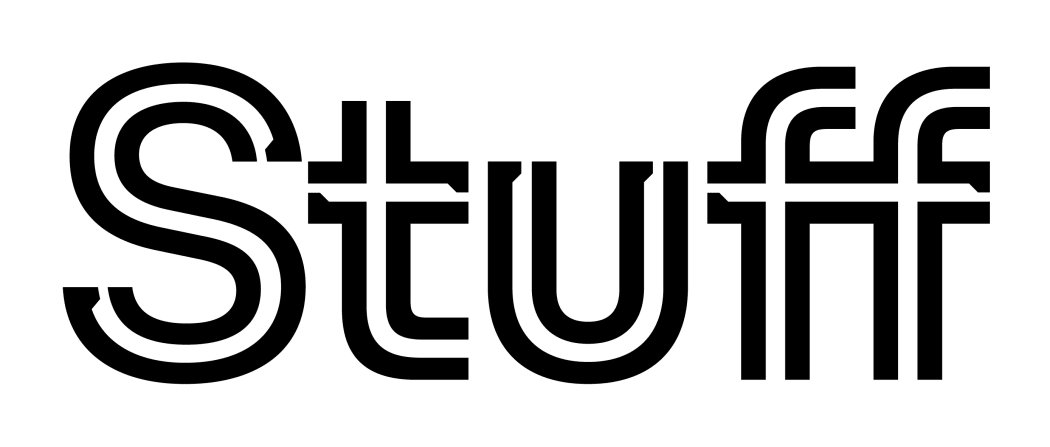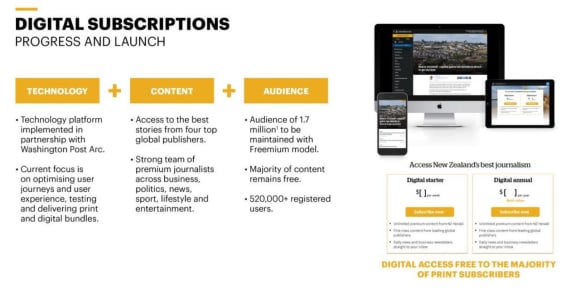
Photo:
The country’s biggest publisher of news will soon begin charging readers of three titles for news online for the first time. Stuff is launching subscription-based websites for The Dominion Post, The Press and Waikato Times, but access to its main national news website stuff.co.nz will remain free.
Stuff’s staff were briefed about the change this morning and it was officially unveiled at an event in Parliament this evening.
The name of Wellington-based daily Dominion Post will also change to The Post on Saturday, as announced on April 14. Stuff’s main news website stuff.co.nz - which has a monthly audience of around 2m - will remain free to use.
“This means that the journalism produced by these newsrooms will largely only be accessible to subscribers while Stuff.co.nz remains the accessible, live, vibrant, addictive news site it is today,” Stuff owner and CEO Sinead Boucher said in a statement.
Stuff has put almost all its news and content online for free since launching stuff.co.nz in 2000. It is the last major New Zealand newspaper publisher to offer online news to paying subscribers only.
Stuff’s statement does not give details of the cost of subscriptions - or when they will begin.
It is also unclear whether significant local stories from three three mastheads with paywalls will be available to online readers nationwide without local subscriptions.
“Each masthead will feature sharp journalism reflecting the unique nature of the regions they operate in,” Stuff’s chief content officer Joanna Norris said in the statement.
Norris said Stuff’s Wellington newsroom “will set the daily agenda” and focus on national issues as well as local ones.
“The (Parliamentary Press) Gallery team will continue to lead the charge on important political news, and the stories behind the policies,” she said
“The Post is the capital’s newspaper, aimed not just at Wellingtonians but people throughout the country who want to know what’s going on behind closed doors in the halls of power, in Parliament and the public sector,” she said.
“The Press and the Waikato Times are fierce champions for their local communities,” said Norris.
Stuff also owns six regional mastheads - including the Timaru Herald, Nelson Mail and Manawatū Standard - as well as the Sunday Star Times and Sunday News. These are not affected by the paywall plan.
Seeking new sources of revenue
Stuff is owned by Sinead Boucher, its former chief editor, who bought the company from its Australian owners for $1 in early 2020. One month later Stuff launched a drive to get online readers to support its journalism with donations.
Stuff is also part of a collective effort to secure payment for news content from online platforms Google and Facebook (Meta) but that has yet to bear fruit.
Stuff has also benefited from the Public Interest Journalism Fund which made $55m available over three years to the media from 2020 on a contestable basis. But that is now coming to an end and the government has prioritised funding for RNZ and NZ on Air over the next four years.
Late last year Stuff reduced the number of reporters in regional newsrooms - and set up new regional reporting teams of editors, news directors and breaking news reporters, some of whom now cover news breaking in other regions.
"We've set up what is effectively an internal news service across regional New Zealand - and a group of reporters who can cover any story anywhere at any time," Stuff's Joanna Norris told Mediawatch last December.
In March Stuff also closed staffed reception areas in offices outside Auckland, Wellington and Christchurch.
Taking the paywall plunge

Photo: supplied
Earlier this month BusinessDesk reported that Stuff “discussed launching a paywall for regional news sites as early as March before delaying the plans ... according to insiders.”
At its AGM yesterday its main rival in online news and content - NZME - announced “more than half” of its 209,000 news subscribers now have digital premium content accounts.
NZME has now hit a target set in 2020 of 210,000 subscriptions by the end of 2023. It is not not far off its goal of more than 12 percent of the nation’s households.
But it took NZME a while to make the leap too.
In 2016, NZME CEO Jane Hastings told Mediawatch a Herald paywall was ready to roll, but it wasn't until 2019 that the Herald launched digital subscriptions for premium content costing $5 dollars a week, while also keeping access to its main website free.
It was part of a strategy to make ‘New Zealand’s Herald’ out of what has historically been an Auckland paper and brand.

A slide from NZME's presentation detailing the paywall plan. Photo: screenshot / NZME
It’s no coincidence that the Herald today launched discounted digital subscriptions and has recently been running billboards with the slogan: ‘The stuff worth knowing'.
Business publication NBR put up a full online paywall in 2014 and eventually ditched its print edition altogether in 2020.
The Gisborne Herald, Ashburton Guardian and Whakatane Beacon all started charging readers online before 2016.
Other long-established news publishers also agonised over the decision.
The Otago Daily Times publisher Allied Press announced a paywall in 2016, telling NBR the newspaper had been "giving away our content free for long enough."
But the ODT paywall didn’t launch until last September, charging new subscribers $15 a month with print subscribers getting online access for free.
That left Stuff as the last publisher without a paywall to get revenue from online readers - until now.

